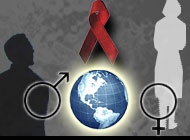World Aids Day seeks to renew awareness of disease

The Swiss National Science Foundation is calling for more research on the social issues surrounding HIV/Aids, as more effective therapies push the disease out of the limelight. The call coincides with World Aids Day on December 1.
In its annual publication on HIV/Aids research in Switzerland, the Foundation highlights the changing nature of the disease in developed countries.
It says that while multi-drug therapies have enabled thousands of people infected with HIV to lead near-normal lives, they are in danger of encouraging a laxer attitude to safe sex.
The Foundation also says that, while the number of sexual or intravenous infections has fallen overall, there is still a high rate of infection among vulnerable or marginalised social groups.
Research focusing on prevention is therefore one of the Foundation’s priorities, together with work on the concrete problems faced by people living with HIV/Aids and their families and friends.
In a guest commentary, the British professor, Peter Aggleton, identifies several challenges facing social scientists and public health authorities.
He says more attention needs to be paid by HIV/Aids workers to the differences between men and women, and to prevention among vulnerable groups such as refugees and asylum-seekers.
Aggleton adds that the “young” must not be viewed as a single category, and that prevention campaigns need to take a more differentiated approach.
In more general terms, he says, research in the field of social science must continue to cast a critical eye on the way the epidemic is understood, on how needs are assessed and on the validity of the solutions put forward.
The National Science Foundation’s publication presents outlines of 55 research projects in the field of HIV/Aids, nearly two-thirds of them social sciences and public health projects.
Among the important scientific projects, one is investigating whether it is possible to live with HIV and not have to take a daily cocktail of medicine to keep the virus in check.
Besides the inconvenience of having to swallow a handful of pills daily at regular intervals, there are fears of side effects, which could increase the risk of a stroke.
The study is attempting to verify anecdotal evidence that occasional pauses in the multi-drug therapy can help build up a patient’s natural immunity to HIV, to the point where drugs are no longer needed.
The Science Foundation pledged to continue giving considerable funds to the Swiss HIV Cohort Study (SHCS), which has been receiving SFr3.5 million annually.
Eleven thousand people with HIV have taken part in the project since 1988, making it the largest collective study in the world.
by Malcolm Shearmur

In compliance with the JTI standards
More: SWI swissinfo.ch certified by the Journalism Trust Initiative
You can find an overview of ongoing debates with our journalists here. Please join us!
If you want to start a conversation about a topic raised in this article or want to report factual errors, email us at english@swissinfo.ch.